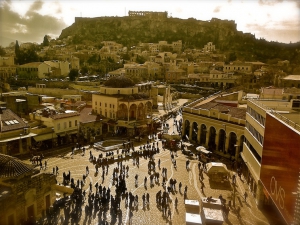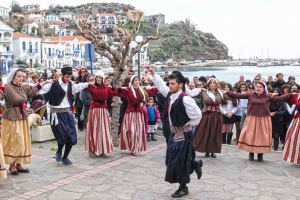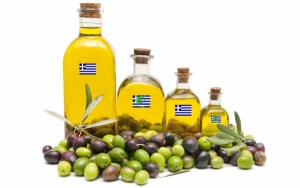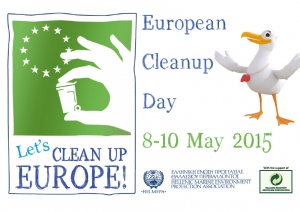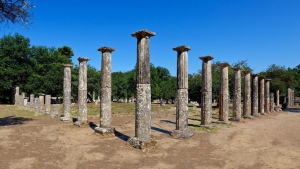ABOUT US
XpatAthens
Friday, 08 May 2015 10:04
Possible Flat Rate VAT At 18%
The flat value-added tax rate being considered by the government will have to be set at 18 percent in order to have a neutral impact (neither positive nor negative) on its revenues. A lower rate of 16 percent, which is apparently being considered by the government, appears not to have been accepted by Greece’s creditors as it would create a fiscal gap and would entail additional austerity measures.
There are currently three VAT rates (6.5, 13 and 23 percent), as well as a 30 percent discount on each for the Aegean islands. The Finance Ministry has calculated that the average rate comes to 17.025 percent; however, it is also planning to exempt certain drugs and a number of food items, which means that the single rate will have to be pushed up to 18 percent to have a neutral impact on revenues.
If the measure passes and the flat rate of 18 percent is imposed from the second half of the year, households will face a significant added burden as the bulk of their expenses are food and electricity, both of which currently carry a 13 percent VAT rate.
Brussels counters that VAT evasion will be reduced with the introduction of a flat rate, noting that most of the tax dodging concerns services taxed at 23 percent. This was the case when the previous government reduced the rate on catering from 23 to 13 percent.
To read more, please visit: eKathimerini.
Published in
Local News
Tagged under
Thursday, 07 May 2015 15:33
Playing The Athens Tour Guide
Summer heat and sunshine brings everyone out of winter hiding, and this includes tourists and friends from far away places. This past week I had the pleasure of playing tour guide to a group of 5 colleagues from various parts of Europe. We had planned a short 2-day team-building break, a well-earned escape from the everyday pressures of work. For most of them, it was their first time in Athens, and expectations were high!
I had planned a jam-packed schedule, an introduction to some of the city's highlights and a taste of 'my Athens'... And I do mean 'jam-packed'. By the end of their stay, we all felt like a week had passed, rather than just 48 hours.
Here's what we did:
After arrival, coffee on the rooftop of the Athens Gate hotel (where they were staying). This is a mid-range hotel, perfect for a city break, in arguably the best location in the city, and with a 3600 rooftop view that is not to be missed.
We wandered around the Acropolis area, and climbed the hill up to the Areopagus for some photos. Then, already in need of more caffeine, we popped in to Root Artspace for a quick refuel.
Dinner was at Kotili taverna on Adrianou St. This is a better-than-average tourist taverna, which also attracts locals, and has live music 7nights per week. If the right crowd is there, you may find some of them dancing too!
The evening ended with a drink at TAF - a city-centre fave hidden away in Monastiraki.
The next morning we did a fun tour of the historical centre with Athens Segway Tours. 2 hours of spinning around the pedestrian streets to see all that we can see - they loved it.
Then we grabbed a taxi and headed towards Glyfada for lunch at Balux House Project. This is a full-on playground for young and old, literally right on the beach, with a delicious menu (from pizza to sushi), and a great relaxed vibe. This was a definite highlight for my guests!
Back to the centre for a quick shopping break... And off to Athens Clue - this is one of the super-popular 'escape rooms' that have taken the city by storm. You take a group of 5-6 friends, get locked in a room, and have 60minutes to figure out the clues and escape the room. Of course, we didn't manage to escape in time - surely we had a very difficult room...
Dinner was at Moma - my default dinner spot in the Monastiraki/Adrianou corridor. On the walk back towards their hotel, we stopped off at Yiasemi, on the famous stairway of Mnisikleous St., for a nightcap and a toast to a wonderful couple of days.
"Can we move our office here?" and "You live in paradise!" were the overall comments. Sure, on the company's tab, everywhere could be paradise. But my colleagues are well-travelled and worldly people. If they think Athens is brilliant, who am I to argue...?
Until next week,
Jack
Balux House Project
Athens Segway Tours
Athens Clue
Published in
My Week In Athens
Tagged under
Monday, 11 May 2015 11:30
British Airways Flies Direct From London To Six Greek Islands This Summer
British Airways announced its Greece summer 2015 schedule which will link London to six Greek islands, two of which are new destinations for the airline.
In addition to flights to Kos, Rhodes, Mykonos and Santorini, this summer British Airways will fly direct to Heraklio and Corfu. The last time British Airways flew to Heraklio was some 30 years ago.
“This demonstrates the distint support of the airline to Greek tourism and gives even more passengers the possibility to visit these destinations”, British Airways said in an announcement.
“British Airways continues to invest in the Greek market, expand its route network and proceed with actions that will boost tourism, local communities and their economies”, said Freddie Stier, the commercial manager of British Airways in Greece.
Published in
Greece In The News
Tagged under
Monday, 11 May 2015 08:00
Authorities Ask Culture Ministry To Include Ikaria Dance On UNESCO List
Authorities and academics from the North Eastern Aegean island of Ikaria, as well as Diaspora Ikariots, are calling on the Greek culture ministry to apply to UNESCO for the inclusion of Ikaria’s traditional dance, the “Ikariotiko”, on its Lists of Intangible Cultural Heritage.
In a letter sent last month to Deputy Culture Minister Nikos Xydakis, Ikariots are citing the example of Andalusia’s flamenco dance, which has already been placed on the list.
Known as “Kariotikos” by the locals, the three-part dance which gradually builds up pace, should, they say, be preserved and recognized as a property of the world and an integral part of Greek culture. Describing it as a cultural asset, the Ikariots are calling for the unique-to-Ikaria dance to be safeguarded.
UNESCO’s Lists of Intangible Cultural Heritage aim to ensure the protection of important oral and intangible cultural traditions worldwide, raising awareness of their significance.
To read more on this, please visit Greek Travel Pages
Published in
Local News
Tagged under
Friday, 08 May 2015 08:00
35 Greek Olive Oils Awarded 'Best In The World' For 2015
Thirty-five extra virgin olive oils from Greece have achieved the distinction “Best in the World” for 2015 at the New York International Olive Oil Competition (NYIOOC), a much stronger showing than in 2014 and a clear sign that the determination of olive oil producers in Greece is paying off.
Twenty-one percent of Greek entries in the world’s largest and most prestigious olive oil quality contest were awarded this time, a lower success rate than rival producer countries Spain and Italy, but a marked improvement over last year’s tally. Nineteen Gold Awards and 16 Silver Awards went to Greek oils. To see a list of the best Greek olive oils for 2015, please click HERE.
Greece submitted more entries (168) in the annual competition than any other country, an indication that producers are striving for quality and to distinguish their brands in the marketplace.
“Winning at the NYIOOC was a big honor for our family,” said Diamantis Pierrakos, who was in New York with his brother Dino to accept the award for the Gold Award-winning brand, Laconiko. “Being recognized at this very prestigious competition has proven to us that our hard work and sacrifices we have made are finally paying off. This distinct recognition is a message that our family, from the small region of Lakonia, Greece, produce one of the world’s best extra virgin olive oils.”
Greek producers have long sold their olive oils in bulk to foreign producers who used the robust kick of the mostly Koroneiki varietals to lift the taste of inferior blends. In recent years, even in the midst of a wrenching economic crisis, Greek olive oil companies have unveiled new, innovative brands while stepping up the quality of their products.
“Greek olive oil quality is trending higher,” said Curtis Cord, NYIOOC president. “What we are seeing now is the rise of Greek olive oil brands to the world stage, a stage on which they rightfully belong.”
Published in
Local News
Tagged under
Thursday, 07 May 2015 08:00
Prepare Your Own Natural Homemade Mosquito Repellent
Summer is nearly here and this brings our old friends the mosquitoes! You can find many mosquito repellents on the market but most of them contain chemical substances.Here are 2 mosquito repellent recipes that are great for the whole family! They are easy to make with simple ingredients.
Natural Body Mosquito Repellent:
Ingredients:
60 ml Jojoba oil or almond oil or coconut oil
20 drops of eucalyptus essential oil
20 drops of cedar essential oil
10 drops of green tea essential oil
3 drops of geranium essential oil
2-3 vitamin E capsules
Preparation:
Pour the vegetable oil and the essential oils in a spray bottle, shake it. Add the vitamin E, and your mosquito repellent is ready. You can spray your body with it whenever you wish.
To read more, please visit: Family Goes Out
Published in
Kids Life
Tagged under
Monday, 11 January 2021 07:00
Top 5 Local Dishes To Try In Athens
Although indulging in a satisfying meal is a pleasure for most people, Greeks in Athens take their food even more seriously.
Unlike some of the spicier specialties found in other parts of the world, Athenian dishes are mild and flavorsome. For the most part, the seasonings used in Greek cooking are the ones you already y have in your spice rack. Another benefit is that Greek cuisine consistently uses olive oil instead of the unhealthy oils that can harm our circulatory systems and hearts.
We’ve chosen 5 of our favorite dishes that you should make sure to taste whenever you find yourself in Athens.
1. Keftedes
These crispy deep-fried balls come in many varieties depending on what part of Greece you visit. For example in Santorini, keftedes are made from juicy local tomatoes, and in Sifnos from chickpeas. However, the most typical varieties are meatballs, cheeseballs, and fishballs.
2. Melitzanosalata
Melitzanosalata is the Greek alternative to Babaganoush, a delicious eggplant dip/spread typically accompanied by crunchy bread or pita bread.
3. Moussaka
Baked and similar to eggplant parmesan but without as much tomato sauce. The dish contains cinnamon, eggplant, ground beef, onions, oil, potatoes, topped with a thick bechamel sauce.
4. Pastitsio
Pastitsio is much like lasagna but not as saucy. The dish consists of layered bucatini-style pasta, ground beef, tomato sauce, and toppings similar to moussaka but not as thick.
5. Stifado
Stifado, one of the most flavorsome stews in Greek cuisine, can be made with beef, octopus, or rabbit– a delicious stifado calls for lots of whole small onions, tomatoes, vinegar, wine, and spices.
Although these are our top 5 picks of dishes to try in Athens, countless other dishes are just as tasty and well worth trying.
Published in
Greek Food & Diet
Tagged under
Thursday, 07 May 2015 08:00
Greece Takes Part in ‘European Clean-up Day’ Campaign
Greece is participating! European Clean-up Day is running from May 8-10. It is a Europe-wide annual clean-up day coordinated by the European Week for Waste Reduction (EWWR) in order to reduce littering in nature and give visibility to the issue.
Over 4,500 volunteers of all ages throughout Greece have already registered their action (beach, underwater and forest clean-ups) with the Hellenic Marine Environment Protection Association (HELMEPA), the coordinator for the European Clean-up Day in Greece. These locations are across 50 coastal and mountain areas, displayed on the campaign’s e-map. Last year, some 5,000 volunteers participated in the event.
HELMEPA invites all to give a helping hand by organizing their own beach, lake, river or even forest, park or neighbourhood clean-up.
For more information about how to participte, please visit Greek Travel Pages.
Published in
Greece In The News
Tagged under
Tuesday, 05 May 2015 17:35
Ancient Olympia Excavations Reveal 30m Colonnade
Excavators believe that additional remnants of an ancient gymnasium still lie hidden, but drainage problems are hindering work.
Another thirty metres of the eastern stoa, or colonnade, of the gymnasium at Ancient Olympia has been revealed in excavations, the Central Archaeological Council said, after a meeting that approved a study to drain rainwater from the site.
Another thirty metres of the eastern stoa, or colonnade, of the gymnasium at Ancient Olympia has been revealed in excavations, the Central Archaeological Council said, after a meeting that approved a study to drain rainwater from the site.
According to the culture ministry, the gymnasium is a large quadrangular building, with central court surrounded by stoas. A series of rooms for the athletes probably occupied the west wing. The better-studied east wing consists of a solid outer wall, an internal double Doric colonnade, and another colonnade of sixty columns along the court.
The colonnade along the court has been excavated to 70 metres; the recent excavations add 30 to this, while excavators estimate another 80 metres remain to be uncovered, if the project can secure further NSRF funding. The project has been included in the 2007-20013 NSRF cycle of funds, which is running out.
To read more, please visit: TheTOC
Published in
Local News
Tagged under
Monday, 04 May 2015 18:11
Traditional Greek Pasta - Pastitsio
Regardless of where pasta originated from, the Greeks have embraced it with open arms and typically incorporated it into their cuisine to make it their own. As well as the many known dishes such as Spagetti Bolognese and Carbonara, which is just as popular in Greece as abroad, there are many other pasta dishes which have been given that Greek touch to them to make them uniquely Greek, such as Pastitsio. Pastitsio is an all time favourite in Greece, especially with children.
This pasta recipe is a great meal to make for a casual dinner with friends, you can make the meal ahead of time, and then, when ready, put it in the oven to bake before serving. Ideal when you don't want to spend a lot of time in the kitchen.
Ingredients
500g pastitsio or macaroni pasta
500g mince
1 onion, finely chopped
1 carrot, peeled and grated
1 tablespoon parsley
2 tablespoons butter
pepper, salt
2 large fresh tomatoes, grated (or 3/4 tin of tomatoes, chopped)
1 or 2 egg whites
2 teacups grated cheese
Bechamel Sauce
1 litre milk, warmed
4 tablespoons heaped plain flour
fresh nutmeg - grated, 3 quick grates (or 3 pinches dried nutmeg)
125g butter
2 egg yolks
salt, pepper
Preparation
Fry onion in butter until soft.
Add mince, fry until brown, breaking up any lumps of mince so it is all small.
Add the grated carrot and parsley and mix in.
Add the tomatoes, which have been grated or put in a blender.
Add salt and pepper. Add some water - about 100-150ml.
Cover and leave to simmer for half an hour.
When ready, cool slightly and stir in the egg whites.
Boil the pasta until al dente. Drain.
Meanwhile you can make the bechamel sauce
To make the bechamel sauce:
Melt the butter in a large saucepan.
Add the flour and mix in well for a while until it goes a bit yellow but doesn't burn.
Add a little milk, mix it in well and slowly add all the rest of the milk.
(At the start use a wooden spoon to mix the flour with the butter, then change to a whisk when adding the milk.)
Whisk thoroughly to make sure there are no lumps.
As you add the milk, have it on a low heat then once all the milk has been added and there are no lumps, you can increase the heat slightly to heat the milk and stirring regularly, the sauce will thicken.
When you add the milk, this is the time that it is possible for the sauce to get lumps in it, especially if you haven't made this sauce before.
To rectify, take the saucepan off the heat, and use an electric hand mixer on the sauce (in the saucepan), until you have a smooth sauce and all the lumps are gone. Return to the heat and warm until it thickens.
Add a little salt and pepper and the nutmeg, be careful not to add too much nutmeg - it really only needs a little amount to give the sauce a wonderful flavour. About 3 quick grates of a fresh nutmeg or 3 small pinches of dried nutmeg.
Nutmeg is only used in bechamel sauce when made to go with pastitsio. If you are using this recipe to go with another meal, you can omit the nutmeg.
When the sauce thickens, leave to cool a while, then add 2 egg yolks, and stir in to the sauce.
In a large deep baking tray, place half the pasta in the tray.
Sprinkle 1 cup cheese over the pasta.
Spread all the mincemeat over the pasta evenly.
Finish with the rest of the pasta, flatten out over the mincemeat.
Sprinkle over the pasta the other cup of cheese.
Pour bechamel sauce all over the top of the pasta and ensure it covers all the pasta.
Dot little pieces of butter over the top of the sauce to give it colour.
At this stage you can leave the pastitsio to bake later or bake straight away.
Bake in a moderate oven for approximately 30-45 minutes, depending on whether the food is already hot or not.
The sauce should have a lovely golden colour.
As with all baked macaroni recipes, even if the food is hot, baking it will help set the layers of food.Source: Ultimate-Guide-To-Greek-Food
Published in
Greek Food & Diet
Tagged under


